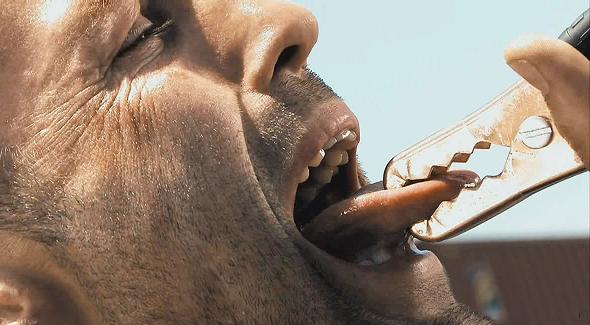 When your correspondent first saw trailers for Crank back in 2006, he grew very excited for what he hoped was a revolution in action movie simplicity. Most action flicks, even the ones held together by cardboard and Elmer’s glue, try to graft some sort of deeper theme onto the narrative. So Jet Li isn’t just kicking a hundred guys in the head – he’s kicking a hundred guys in the head for honor. Tony Jaa doesn’t just travel to Thailand and break people’s arms – he travels to Thailand and breaks people’s arms to preserve the traditions of his village. But Crank seemed to promise a beautiful austerity – a premise that could be understood in the first six words of the trailer. “If you slow down, you die!” Brilliant! End of story! Now get to Jason Statham shooting people.
When your correspondent first saw trailers for Crank back in 2006, he grew very excited for what he hoped was a revolution in action movie simplicity. Most action flicks, even the ones held together by cardboard and Elmer’s glue, try to graft some sort of deeper theme onto the narrative. So Jet Li isn’t just kicking a hundred guys in the head – he’s kicking a hundred guys in the head for honor. Tony Jaa doesn’t just travel to Thailand and break people’s arms – he travels to Thailand and breaks people’s arms to preserve the traditions of his village. But Crank seemed to promise a beautiful austerity – a premise that could be understood in the first six words of the trailer. “If you slow down, you die!” Brilliant! End of story! Now get to Jason Statham shooting people.
However, upon watching Crank again – in anticipation of the surprising release of Crank 2: High Voltage this Friday – one discovers new themes. This deceptively simple tale, of a British hitman fleeing the mob while under the effects of an adrenal inhibitor, has so much more beneath the surface. And there is a lot of surface – it’s a very superficial tale.
But what does Crank have to say about the human condition?
Crank as Allegory for the Young Man’s Fear of Commitment
Chev Chelios (Statham) wakes up as the movie begins. He lives in a gorgeous apartment in an L.A. high-rise – exposed brick, big flat screen TV, lots of windows and ambient light. He soon learns that he’s been poisoned with the “Beijing cocktail” – a synthetic drug blend that blocks his adrenal receptors (“if you slow down, you die!”). Taking to the streets, he makes a series of phone calls and visits – to a local snitch, to a hoodlum on the other end of town, to the guy who injected him with the poison, to a street doctor who might have a cure. And, of course, to his girlfriend.
He reaches all of these people except his girlfriend, Eve (Amy Smart) – a sun-kissed California stoner who sleeps in late and gets easily distracted. After several mega-doses of drugs to keep his heart racing, Chelios gets to his girlfriend’s cozy, homey apartment. She doesn’t know what he does for a living, apparently, so he tries to act casual as he scoots her out of the apartment. She refuses to be hurried, though, asking him to go fix her microwave while she gets dressed.
While playing with the microwave, the drug-induced high that’s been pumping his adrenaline starts to wear off. Panicking, Chelios slams his hand in a hot waffle iron.
Let’s review:
- While running around, assaulting the people who tried to poisoned him and keeping his heart rate up, Chelios cannot reach his girlfriend. He can reach everyone else he needs to – the snitch Kaylo, the doctor who diagnoses him, even the man who poisoned him – but not her. It’s only after he crashes a motorcycle – entering a period of relative calm – that she calls him back. But remember, in the language of film that Crank employs, calm equals death.
- When confronted with the trappings of domesticity – fixing the microwave, waiting for his girlfriend to get dressed so he can start his day – Chelios literally starts dying.
Now with girlfriend in tow, Chelios flees to Chinatown. His heart rate begins to slow down again. In order to raise his adrenaline level, he drags Eve down to the pavement with him and has sex with her. She argues initially but eventually warms to the idea (which is fortunate, because otherwise our hero would be a rapist).
So add to those two points above a third: Chelios can only regain his grip on life by rejecting the veneer of domesticity. Instead of treating his woman with tenderness and compassion, he takes her in a very public and primal display. You can almost imagine this sort of alpha-male-claiming-the-alpha-female spectacle around the watering hole 100,000 years ago. Chelios thrusts his arms into the air and screams, “I’m alive!” while having sex with his girlfriend up against a mailbox. Chinese tourists snap pictures and a bus full of Japanese schoolgirls look on in giggling admiration.
If that doesn’t confirm the metaphor, we don’t know what would.
Most men fear the notion of commitment. Evolution drives us to seek many mates, while Western culture drives us to spend our lives with one. Crank depicts the warring impulses as a literal race against the (biological) clock. Is Chelios still man enough, or is he going to settle down? The answer, apparently, is both.
Crank as Allegory for Globalization
Chelios works for a California crime syndicate, composed primarily of Chicanos. He reports to a boss named Carlito, at whose behest he murdered a Chinese mob boss named Don Kim (off-camera, before the action of the film starts). Chelios gets poisoned by a small-timer named Ricky Verona, a Mexican who has passionate ties to his family.
By the end of the film, it turns out that Verona administered this “Beijing cocktail” under Carlito’s orders! Quite a double-cross. Fortunately, Chelios never actually murdered Don Kim. So the Chinese mob boss shows up to lend Chelios some firepower. Guns go off, the final showdown unfolds, etc.
Chelios is a British hitman, living in L.A., caught in a power struggle between Mexican gangs and Chinese triads. Let’s simmer that melting pot, shall we?
- The British colonized the United States nearly four centuries ago. At this time, the British Empire was in its ascendancy, having defeated the Spanish Armada forty years earlier. It had no serious rivals in might or commerce. It expanded its Empire across the globe – to Columbus’ New World, to the subcontinent of India, and to the shores of Hong Kong. But like all empires, it grew sere and declined. By 2006, the New World was an independent collection of United States, India had its own government and even Hong Kong was handed back to the Chinese. Britain is no longer the Empire it once was.
- Los Angeles represents the archetype of the American city. L.A. brings together a vast swath of cultures – black, Chinese, Japanese, Dominican, Mexican, etc – into a dense megalopolis. It requires immense amounts of wealth just to keep it functional; as Chinatown reminded us, L.A. is essentially desert. Los Angeles’ chief export is style: television, movies, fashion and image. Los Angeles may not be the soul of America, but it’s undoubtedly America’s face.
- The Mexicans and the Chinese are key contributors to America’s wealth. Mexico provides a steady stream of low-paid laborers – some legal, some not – to keep America’s industries churning. China not only supplies immigrant labor, but also holds a substantial number of U.S. Treasury bonds, making the deficit spending of the last four decades possible. Mexico and China are two of the key players that make America’s position as the world’s superpower possible.
So who wins? China wins.
Several characters, when identifying the drug Chelios has been poisoned with, stress that it’s a “Chinese synthetic,” as if that speaks for itself. Of course there’s no antidote – the poison comes from China. The name “China” has gone from a sign of shoddy knock-off to a sign of true manufacturing quality.
And in the final firefight, it’s Don Kim who appears – as if rising from the dead, immortal and unblemished – and miraculously turns the tide. It’s the Mexicans who die in great numbers and flee in panic.
Viewed as an action movie, Chelios is clearly the protagonist of Crank. Viewed as a turf war between two great powers, Chelios is almost a footnote. He (Britain) is clearly incidental to the ongoing war (in America) between the triads (China) and the gangs (Mexico). It doesn’t matter, ultimately, whether Chelios avenges himself on his murderers or whether they turn on each other. Before the movie even starts, the poison already flows through the old Empire’s bloodstream. He is already dead.
Crank as Allegory of Man’s Search for Meaning in the Face of Death
The final interpretation of Crank is a rather obvious reading. But it conveys the most powerful message.
Chelios is a man who wakes up one morning and learns that he’s going to die. What follows is a quick but erratic tour of the Kubler-Ross five stages of grief. He spends some of his first hour in denial – asking his doctor for a cure, chasing down Verona to find an antidote. Then he proceeds to anger, swearing that if he goes down he’s taking his murderer with him. He flirts briefly with bargaining, struggling to get to his girlfriend’s place so he can tell her he was about to give up the assassin’s life for her. Then Chelios skips depression (because that’s boring), backtracks to anger (the final firefight), and ends the movie in acceptance of his fate.
Chelios knows, from the start of the action, that he’s going to die. But we all know that we’re going to die.
We may not have internalized that knowledge with the intense certainty that Chelios has. But Chelios feels the symptoms keener than any of us. His vision blurs, his heart struggles to beat. If most of us spend our waking hours denying the fact of our mortality, Chelios can no longer deny it.

And what shoulder, and what art could twist the sinews of thy heart? - William Blake, Crank 2: High Voltage
Confronted with the fact of his own death, Chelios spends his next – and last – hour rushing to do all the things he meant to do. He has to eliminate Ricky Verona, because the thought of his killer outliving him offends his sense of justice. He has to tell his girlfriend how he really feels about her. All of the things he put off become top priority. Chelios’ new philosophy isn’t actually new – it’s the notion of carpe diem the Romantics have sold us on for centuries. He hears time’s winged chariot at his back, to quote Marvell, and hurries on.
But in the course of fulfilling these goals, Chelios comports himself rather comically. He picks a fight with a bar full of gangers in order to get his heart rate up. He robs a crash cart in a hospital, evades police pursuit in a shopping mall, and runs around in a flapping hospital gown. He gets bloodied, intoxicated, humiliated and disoriented, all in the name of buying himself a few more precious minutes of living.
Is life worth such hardships? If yes, then what sort of nobility can the human race pretend to, if it’ll snort cocaine off a bathroom floor in order to stave off death for an hour? If not, then does that make death a fair price to pay for dignity?
Our species has struggled with these questions since before the age of Socrates. Crank tackles them in 87 minutes.



Add a Comment